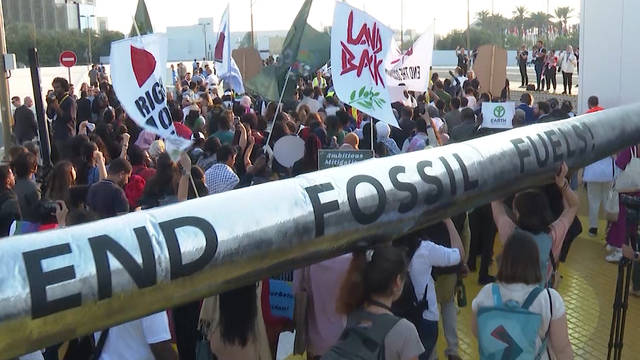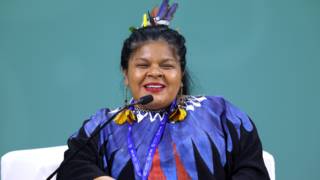
Related
By Amy Goodman & Denis Moynihan
Ain Dubai, in English, The Eye of Dubai, is touted as the world’s largest Ferris wheel. The 820-foot tall wheel dominates the man-made island on which it rests. The massive, unblinking Eye permanently stares upon Dubai’s beachfront, its thicket of high rise luxury hotels and its marina, brimming with foreign-owned yachts. The Eye operated for only a few months before being abruptly shuttered in 2022. People can only speculate why, as the United Arab Emirates, the autocratic petrostate that governs Dubai, won’t say. One theory posits the wheel is slowly sinking into the sand, and that the structure, 25% heavier than the Eiffel Tower, will eventually topple, crushing the luxury residential high rises that surround it. The Eye thus stands as a glaring metaphor for humankind’s folly, trying to bend Nature to our will, and failing.
Across Dubai, Expo City is the sprawling facility where the UAE hosted COP28, this year’s annual summit of the three-decades-long global effort to tackle climate change, the United Nations Framework Convention on Climate Change (UNFCCC). All-night negotiations heated up as the two-week event neared its scheduled conclusion. Led by this year’s COP president, Dr. Sultan Al Jaber, the CEO of the UAE’s state-owned Abu Dhabi National Oil Company, the gathered diplomats missed their Tuesday deadline, arguing over whether or not the final document would encourage a total “phase out” of fossil fuels or only the more mildly worded “phase down.”
In the end, the bleary-eyed negotiators used neither phrase, perhaps overwhelmed by the assembled army of petrostate representatives and 2,400 or more fossil fuel lobbyists. The final text promised, instead, the “[t]ransitioning away from fossil fuels in energy systems, in a just, orderly and equitable manner.” Activists praised the first-time use of “fossil fuels” in a UNFCCC document. The climate activist group 350.org called it a “weak but welcome nod” in an otherwise “loophole-ridden text.”
As COP28 started, climate scientist Kevin Anderson predicted on social media, “This is a Cabal of Oil Producers not a climate COP. The outcome is known.”
Anderson didn’t attend COP28, in part because he won’t fly due to aviation’s global greenhouse gas emissions, but also because of his growing skepticism with the process.
“At every single level, the tendrils of Big Oil are changing our society and fundamentally changing our climate,” Anderson said on the Democracy Now! news hour, halfway through COP28. “These COPs have become little more than a scam under which the oil and other fossil fuel companies are hiding that nothing is being done.”
The outcome of COP28 includes a Global Stocktake, an assessment of how the world’s 200+ nations are doing eight years after the UNFCCC’s Paris Agreement was hammered out in 2015, with its aspirational goal of limiting global warming over pre-industrial levels to 1.5 degrees Celsius (2.7 degrees Fahrenheit).
The loopholes mentioned by 350.org allow continued extraction and burning of fossil fuels. “Phasing out inefficient fossil fuel subsidies” is encouraged, which suggests that “efficient” fossil fuel subsidies exist, a point the climate divestment movement refutes. The document also claims that “transitional fuels can play a role in facilitating the energy transition.” This clearly refers to methane, marketed by the industry as “natural gas,” which is many times more potent as a greenhouse gas than carbon dioxide.
Then there is the issue of who is going to pay to move the global economy off of its dependence on fossil fuels.
“None of the transition is funded,” Asad Rehman, lead spokesperson for the Climate Justice Coalition, said from COP28 after the deal was finalized. “The idea of providing climate finance, public climate finance, that is really desperately needed, is being frittered away. Instead, the only mentions of finance are about private capital.” To attract the vast sums needed, Rehman says, “you’re lowering environmental standards. You’re lowering workers’ rights standards. You make your economy much more attractive to private capital…so now the responsibility has fallen on developing countries to guarantee profit. It’s utter madness.”
COP29, next year’s summit, will be in Baku, Azerbaijan, another repressive petrostate. Human Rights Watch reported on December 5th, “A new wave of repression in Azerbaijan is targeting foreign-funded independent media as well as journalists who criticize the government and expose high-level corruption.” Six journalists were arrested.
Petrostates like the UAE and Azerbaijan play predictable roles in protecting the status quo, but it’s the world’s biggest petrostate that brandishes the most power inside the COPs: the United States. As the largest producer and exporter of fossil fuels, and as the world’s largest historical emitter of greenhouse gasses, the US bears the most responsibility for the climate crisis. While negotiations move from the shifting sands of Dubai with its sinking Eye to Azerbaijan, what people demand of their elected leaders, here in the United States, matters around the world.











Media Options